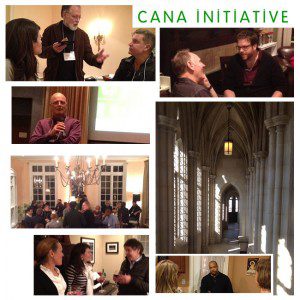Thanks to Philip Clayton for contributing this important piece on the first gathering of progressive leaders as part of the new CANA Initiative.
 Before Thanksgiving some 85 movement leaders from around the U.S. met at the National Cathedral in Washington DC to launch a nation-wide “network of networks,” which we’re calling CANA: the Collective Action Network of America. Here’s how some of them described it:
Before Thanksgiving some 85 movement leaders from around the U.S. met at the National Cathedral in Washington DC to launch a nation-wide “network of networks,” which we’re calling CANA: the Collective Action Network of America. Here’s how some of them described it:
”What is CANA?
A collective of Christian leaders, organizations and networks across the United States who collaborate to embody and act on a courageous, liberating and compassionate faith.
What do we love and what do we hope?
- To follow the movement of the Spirit by seeking reconciliation with God, our neighbors, and the earth; by making a fierce and constant commitment to God’s justice; and by nourishing generous Christian communities that unapologetically proclaim and seek God’s kingdom in their shared life and in the world.
- To connect around a liberating moral vision for America and do more together than we could ever dream alone.
- To participate in God’s reign of love breaking in everywhere and in everyone.
(Stephanie Spellers, Jack Jenkins, Eric Elnes, Anthony Smith, & others)
Those are powerful, visionary words. Like the meeting itself, they make your heart beat faster, maybe even draw tears of hope. We’re surrounded by so many negatives: the collapse of mainline churches, the battle between conservatives and progressives, the patterns of hypocrisy. Could it be that God is in the decline? Could it be that, out of the dust of collapse, phoenix-like — resurrection-like — more authentic Christian communities will arise?
On the other hand, many of us at the National Cathedral, like many hearing about the meeting, are skeptical. We’ve been burned once too often; we’ve watched too many idealistic Christian movements and leaders come crashing down. Forgive us our cynicism, as we forgive the cynics around us. So instead of eulogy, I start with the darker side:
Nope. Won’t work. Hasn’t got a chance.
“Collective Action Network of America”? I don’t know — it just sounds too, well, secular as a name for a Christian movement. Don’t Christian movements have names like the Global Missionary Alliance or Evangelicals for America or things like that?
We live in a deconstructed and a deconstructing age. As soon as we create a name, we stop believing in it. (We do the same with leaders too.) “Liberal” has come to have such negative connotations that even liberals won’t use the term anymore. Many say that the connotations of “progressive” are now more political than religious. And “emergent” is under major attack from conservative Christians — one of whom just told me that the whole emergent movement exists only because of secret financial contributions from the mainline denominations. (I asked him to tell me where all this alleged money is coming from, so that I can go and get some.) As Rev. Peter Mathews warned, progressive and emergent sound “Pier 1.” Instead of an exclusive club, he added, we need a WalMart movement.
But today, flying home from the meeting, I now think my inner cynic’s fears were misplaced. To see why, you have to think the words through in the right order:
Action. We don’t want a new denomination, a new label, a new set of words. The situation in American is too serious, and the problems are too deep for that. It’s time to go do stuff. It’s time for an experimental Christianity, a Christianity lived out in the streets (and pubs and coffee houses), a Christianity that takes its feet and hands where the real needs are. Christian discipleship is, after all, a performance art. For too long it’s been locked in concert halls and museums (and churches), imprisoned in academic textbooks, made a pawn in political battles and economic take-over bids. If this “movement of movements” doesn’t start with action, it’s not worth having.
Collective. Remember our story. When we couldn’t find our home in the white-steepled churches any longer, we started leaving. The pundits called us “spiritual but not religious.” It was a necessary move: we had to find out whether we could still have faith, faith of any kind, when we couldn’t live inside our parents’ institutions any longer. The Pew survey counted us last year and found that almost 1 in 3 of younger Americans now call themselves “nones” — non-affiliated.
Many of us found that the word “Christian” didn’t survive this exodus from the old houses of worship, like a fragile glass antique that gets broken during the U-Haul move. So they let it go and chose to live by other names. But the more surprising thing is that, for many of us, “Christian” did survive the move. In fact, the draw of the peace-making rabbi grew with new energy and intensity . We found something raw and contemporary in the Jesus of the parables: his blunt speaking of truth to power, his insistence on people over doctrine, and his unfailing focus on “these, the least of my brethren” (Matt. 25). As our old affiliations grew weaker — denominational identities, old doctrinal disputes, the “-isms” in general — this Jesus grew stronger.
That was the first surprise; a second followed in its wake. The discovery that we could still be Jesus-followers gradually birthed a desire to connect with others like us. Some of us reconnected in churches, others in coffee houses and house churches, some in justice activism and community service. Different than the private spirituality of the baby boomers, we value connections.
Network. Every community, every group of connections, is a network. New kinds of networks are popping up all over the country. Perhaps because most are small, the media doesn’t notice. A nation-wide network of networks will bring attention. We can share what we’re learning, exchange resources, support each other. Together we’ll be stronger than alone.
of America. We need to stop speaking for the whole world. It’s time to fix what’s broken at home. When we’ve learned to live well, and justly, with our own diversity, we can broaden the networks.
See? Collective Action Network of America. In the right order, it works. The CANA leaders then gave a new twist to the acronym:
“What will we do?
Broadly, we will engage in constructive, collective action. Specifically, we will …
- CONNECT groups and institutions that share common loves and common hopes, gathering a network of networks that embody a positive, progressive, courageous, and compassionate Christian ethos.
- ADVOCATE for this new ethos by engaging in passionate, constructive and civil conversation with the wider public and within broader religious, civic and educational structures.
- NOURISH those who embody this ethos by creating diverse communities of encouragement and accountability; networked structures that are sustainable and expandable; and a sustainable financial base.
- ACT by identifying shared priorities and issues, collaborating across denominations, racial and ethnic backgrounds, and organizational specializations for the sake of the common good.”
Connect, Advocate, Nourish … and Act! My inner skeptic isn’t completely silent. But for now, this feels like just what we’ve been asking for. At least it’s the best I’ve seen so far. It would be hypocritical just to stand on the sidelines, hypocritical not to try.
So: Is it time? Is this the right way to start? Are these the right priorities?
If you want to learn more, go to www.canainitiative.org . And join in!











